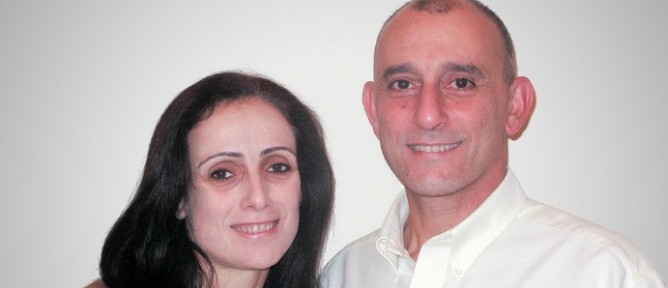
Arab Christians Reem and Imad Younis met at the Technion and started their own neurosurgery products business in Nazareth.
Two Arab Nazarenes meet at the Technion-Israel Institute of Technology in Haifa, fall in love, get married and move back home to start a high-tech business financed only by the sale of their car.
Doesn’t sound like a recipe for success? Well, it worked out fine for Imad and Reem Younis, whose company Alpha Omega is a world leader in producing pioneering products for neurosurgery and neuroscience research.
• Email this article to friends or colleagues
• Share this article on Facebook or Twitter
• Write about and link to this article on your blog
• Local relevancy? Send this article to your local press
Last June, Alpha Omega was named the 2012 American Israeli Company of the Year by the American Israeli Chamber of Commerce in Atlanta, Georgia. One of its international sales and support offices in based in Alpharetta, near Atlanta.
Reem Younis, a civil engineer (her husband’s degree is in electrical engineering), explains: “Alpha Omega’s knowhow is ‘driving’ safely inside the brain with an electrode, recording neural activity, stimulating neural tissue, processing and analyzing the data.
“In simple terms, you can look at it as a GPS inside the brain that guides the neurosurgeon to the required location, where a permanent electrode is implanted. This treatment is supposed to eliminate disease symptoms, and the patient can go back to his or her normal life.”
The company’s recording and stimulation tools, which have both FDA (US) and CE (Europe) approvals, are helpful in two realms. Neuroscientists use them in the lab to understand more about the human brain, and neurosurgeons use them for treating patients with a variety of neural disorders such as Parkinson’s disease and dystonia, a nervous system disorder that causes involuntary muscles contractions and spasms.
“In Europe this method is used also for treating people with [clinical] depression,” says Younis.
Meeting future needs
Alpha Omega was established in 1993 in Nazareth, a Christian Arab city that recently hosted its first Startup Weekend event. The company’s sophisticated machinery is manufactured locally and sold through offices in the United States, Israel and Germany, as well as by sales representatives in China, Japan and South America.
The mainly Christian and Muslim Arab staff of 35 in Alpha Omega’s Nazareth headquarters are graduates of the Technion or Tel Aviv University.
During Global Entrepreneurship Week in November, Reem and Imad Younis went from one northern Arab municipality to another, explaining their company’s technology and entrepreneurship model to high school students with the goal of encouraging other innovators like themselves.
“We are 20 percent of the [Israeli] population and also need to be 20% of the Israeli high-tech scene, but we are not,” says Younis. “It’s closer to 1%. Alpha Omega is about bringing high-tech to Nazareth and giving employment to very highly qualified engineers.”
She says the company’s equipment is well known around the world for accuracy and stability. “We are in more than 100 hospitals and more than 500 labs on six continents. Our main market is, of course, the USA.”
Younis says one reason for the company’s success is its close relationship with the research community, particularly at the Hadassah University Medical Center in Jerusalem and other top researchers in Israel and beyond.
“Because Alpha Omega is involved in both the medical and research fields, we hear about new needs and trends,” says Younis. “We know where the market is leading in five or 10 years, so that our excellent teams will develop the appropriate systems for serving humanity and fulfilling the company’s mission.”

